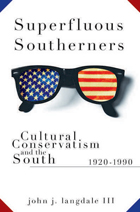2 books about Cultural Conservatism

Cultural Conservatism, Political Liberalism
From Criticism to Cultural Studies
James Seaton
University of Michigan Press, 1996
Cultural Conservatism, Political Liberalism is an impassioned response to the debates on culture and the literary canon over the last decade. James Seaton argues that the attempts of E. D. Hirsch and Allan Bloom to unite cultural conservatism with political liberalism have been inadequate. He believes that their fullest integration is found not in a doctrine, but in a tradition, the tradition of cultural critics from Mencken through Ellison.
Chapters on Lionel Trilling, H. L. Mencken and Irving Babbitt, Ralph Ellison, Dwight Macdonald, Diana Trilling, and Edmund Wilson affirm the continuing pertinence of their work to today's concerns. Seaton then turns to the careers of Leslie Fiedler and Susan Sontag to explore the impact of the cultural radicalism of the sixties on literary criticism. Subsequent chapters analyze the successes and failures of contemporary cultural studies through the writings of Richard Rorty, Edward Said, Stanley Fish and Fredric Jameson.
Separately, these chapters provide provocative readings of the individual critics; together they make a case for the tradition exemplified by these critics as an alternative to contemporary cultural studies. The issues the book discusses extend beyond literary criticism and the academic world to the political-religious- cultural conflicts of today's culture wars.
"These lively, closely argued essays explain very clearly what the issues are, how they arose, and why they are important." --Christopher Lasch
"A forceful argument about the relationship between literary studies and politics that will add something important to the vigorous, and often fierce, discussion of the canon, the politics of literature, and educational reform."--William Cain, Wellesley College
James Seaton is Professor of English, Michigan State University. He is co-editor, with William K. Buckley, of Beyond Cheering and Bashing: New Perspectives on the Closing of the American Mind.
Chapters on Lionel Trilling, H. L. Mencken and Irving Babbitt, Ralph Ellison, Dwight Macdonald, Diana Trilling, and Edmund Wilson affirm the continuing pertinence of their work to today's concerns. Seaton then turns to the careers of Leslie Fiedler and Susan Sontag to explore the impact of the cultural radicalism of the sixties on literary criticism. Subsequent chapters analyze the successes and failures of contemporary cultural studies through the writings of Richard Rorty, Edward Said, Stanley Fish and Fredric Jameson.
Separately, these chapters provide provocative readings of the individual critics; together they make a case for the tradition exemplified by these critics as an alternative to contemporary cultural studies. The issues the book discusses extend beyond literary criticism and the academic world to the political-religious- cultural conflicts of today's culture wars.
"These lively, closely argued essays explain very clearly what the issues are, how they arose, and why they are important." --Christopher Lasch
"A forceful argument about the relationship between literary studies and politics that will add something important to the vigorous, and often fierce, discussion of the canon, the politics of literature, and educational reform."--William Cain, Wellesley College
James Seaton is Professor of English, Michigan State University. He is co-editor, with William K. Buckley, of Beyond Cheering and Bashing: New Perspectives on the Closing of the American Mind.
[more]

Superfluous Southerners
Cultural Conservatism and the South, 1920-1990
John J. Langdale III
University of Missouri Press, 2012
In Superfluous Southerners, John J. Langdale III tells the story of traditionalist conservatism and its boundaries in twentieth-century America. Because this time period encompasses both the rise of the modern conservative movement and the demise of southern regional distinctiveness, it affords an ideal setting both for observing the potentiality of American conservatism and for understanding the fate of the traditionalist “man of letters.” Langdale uses the intellectual and literary histories of John Crowe Ransom, Donald Davidson, and Allen Tate—the three principal contributors to the Agrarian manifesto I’ll Take My Stand—and of their three most remarkable intellectual descendants—Cleanth Brooks, Richard Weaver, and Melvin Bradford—to explore these issues.
Langdale begins his study with some observations on the nature of American exceptionalism and the intrinsic barriers which it presents to the traditionalist conservative imagination. While works like Louis Menand’s The Metaphysical Club have traced the origins of modern pragmatic liberalism during the late nineteenth century, the nature of conservative thought in postbellum America remains less completely understood. Accordingly, Langdale considers the origins of the New Humanism movement at the turn of the twentieth century, then turning to the manner in which midwesterners Irving Babbitt and Paul Elmer Moore stirred the imagination of the southern Agrarians during the 1920s.
After the publication of I’ll Take My Stand in 1930, Agrarianism splintered into three distinct modes of traditionalist conservatism: John Crowe Ransom sought refuge in literary criticism, Donald Davidson in sectionalism, and Allen Tate in an image of the religious-wayfarer as a custodian of language. Langdale traces the expansion of these modes of traditionalism by succeeding generations of southerners. Following World War II, Cleanth Brooks further refined the tradition of literary criticism, while Richard Weaver elaborated the tradition of sectionalism. However, both Brooks and Weaver distinctively furthered Tate’s notion that the integrity of language remained the fundamental concern of traditionalist conservatism.
Langdale concludes his study with a consideration of neoconservative opposition to M.E. Bradford’s proposed 1980 nomination as head of the National Endowment for the Humanities and its significance for the southern man of letters in what was becoming postmodern and postsouthern America. Though the post–World War II ascendance of neoconservatism drastically altered American intellectual history, the descendants of traditionalism remained largely superfluous to this purportedly conservative revival which had far more in common with pragmatic liberalism than with normative conservatism.
[more]
READERS
Browse our collection.
PUBLISHERS
See BiblioVault's publisher services.
STUDENT SERVICES
Files for college accessibility offices.
UChicago Accessibility Resources
home | accessibility | search | about | contact us
BiblioVault ® 2001 - 2024
The University of Chicago Press









